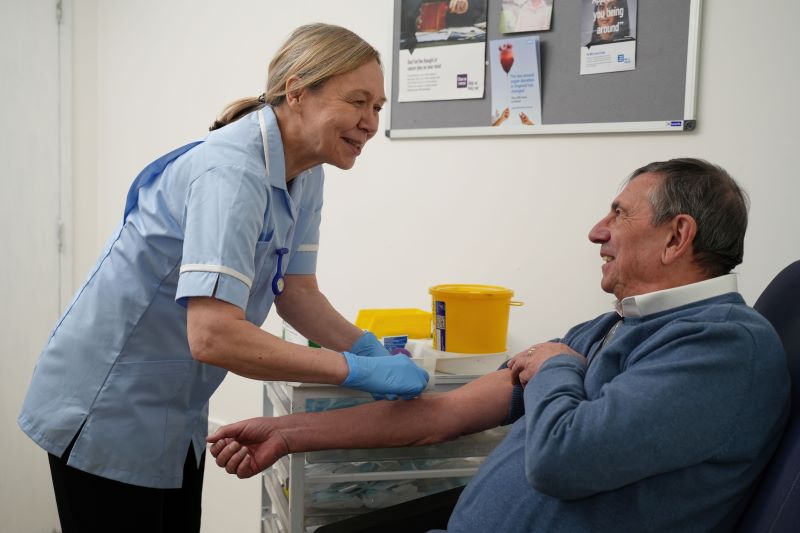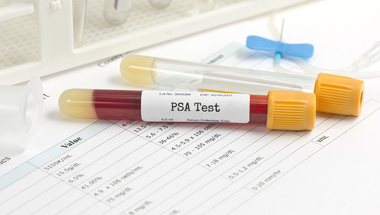Campaigns
12 Jun 2024Our message to next government: it's time to change outdated approach to prostate cancer tests
This Men’s Health Week, we’re calling for an end to the system that forces men at high risk of prostate cancer to ask for their own tests, reducing their chances of an early diagnosis.

Today we’re launching our campaign calling on the next UK government to update outdated NHS prostate cancer guidance that is putting men’s lives at risk and making health inequalities worse.
The current system means that men at more than double the risk of prostate cancer – including Black men, and those with a family history of the disease – must request their own tests, with GPs told not to raise the issue with men unless they have symptoms.
However, evidence shows that early-stage prostate cancer doesn’t usually cause symptoms, creating a situation that puts men at risk of being diagnosed too late for a cure.
That’s why, this Men’s Health Week, we’re calling for parliamentary candidates to commit to tackling one of the biggest inequities in men’s health.
The next government must update the guidance and allow healthcare professionals to proactively speak to men at highest risk – including Black men and men with inherited risk – about their options so they can choose whether to have a PSA blood test.

NHS’s outdated prostate cancer guidance is failing men
The earlier you diagnose prostate cancer the easier it is to treat. But currently only half of men (53%) are diagnosed at stage 1 or 2 – a long way off the NHS target of 75% by 2028. The status quo is also likely to drive health inequalities, particularly for Black men and men in poverty.
Chiara De Biase, our Director of Health Services, Equity & Improvement, said: “We simply can’t continue with a system where men at high risk of prostate cancer can get a test – but only if they know to request one.
“This outdated guidance is failing both men and their clinicians, making health inequalities worse and putting lives at risk. It’s about time that changed.
“10,000 men are diagnosed late each year, and we want the next Government to fix this failing system and start allowing clinicians to have these lifesaving conversations with men.”

Ensuring men and clinicians understand new guidance
To make sure men can access these conversations and to reduce pressure on GP services, we're also calling for other trained healthcare professionals – such as practice nurses – to be trained in counselling men on prostate cancer and PSA testing.
We’re also pushing for a funded plan to promote the updated guidance so that men and their clinicians understand it.
Patrick Nyarumbu MBE, an Executive Director in the NHS, was discouraged from getting tested by his GP – despite being at high risk of the disease.
He said: “I’m 45 and Black. My dad died of prostate cancer and my sister died of breast cancer. I went to my GP to ask for a PSA test and was told – ‘I can do a rectal exam if you really want, but it’s a bit painful – so it depends if you want that’.
“It’s bad enough that my GP was trying to discourage me from getting tested even though I was at such high risk, but I now know that a rectal exam isn’t even necessary, and you can be referred on with just a blood test.
“People see me as a senior leader in the health service and think I should be able to self-advocate. But it’s different when it’s your health. You’re thinking about the implications for your family. If someone discourages you it’s easy to think, ‘maybe I’ll be ok’.”
A lot of men don’t come forward because they think they’ll be invited as part of routine tests - but this simply isn’t true.
Encouraging men to check their risk of prostate cancer
This campaign is part of our push to save more lives by encouraging men to check their risk of prostate cancer.
Last week, we highlighted some of the biggest barriers that prevent men coming forward – including the fact that 80% of men wrongly think they’ll be tested for prostate cancer as part of routine health checks.
In fact, prostate cancer is the most common cancer without an NHS screening programme, and GPs don’t contact men who have a higher risk of getting prostate cancer to tell them about getting tested.
We recently announced our £42million TRANSFORM trial designed to find the best way to screen men for prostate cancer, but until then, we’re working to ensure all men know their risk and what to do about it.
Chiara De Biase added: “We know that a lot of men don’t come forward because they think they’ll be invited as part of routine tests - when this simply isn’t true.
“The long-term answer is a screening programme for all men, and the results of our TRANSFORM trial will tell us the most effective way to do that. Until then, we all need to work together to make sure men know their risk and what they can do about it.
“We’re doing all we can to raise awareness, and now we’re asking for the next Government to do its part by giving doctors the power to proactively reach out to men at highest risk.”






